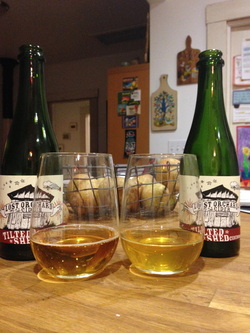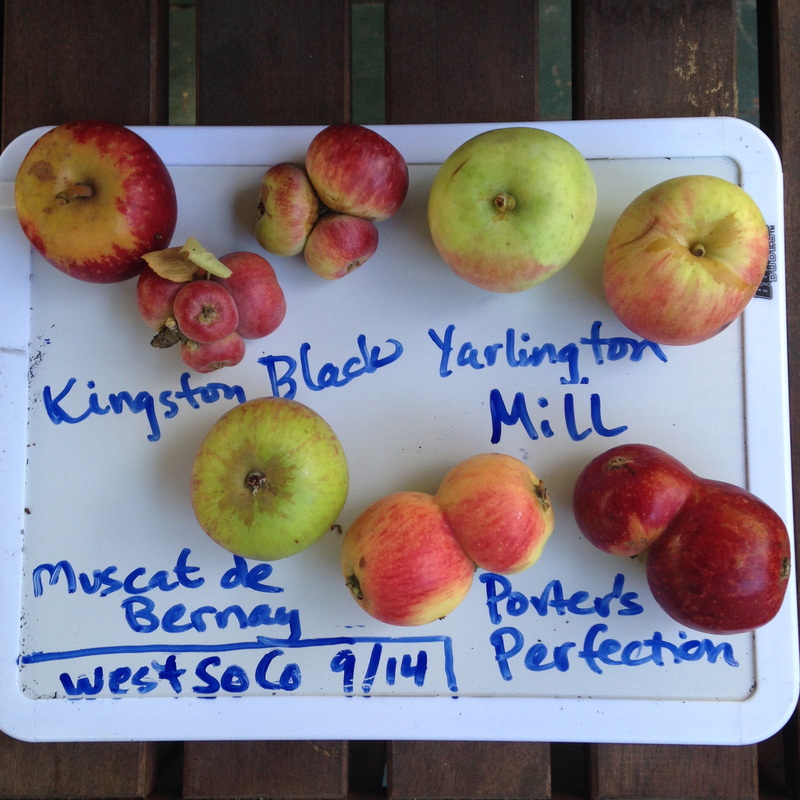 2012 vs 2013 Lost Orchard: check it! 2012 vs 2013 Lost Orchard: check it! It should come as no surprise that I drink quite a bit of cider. I usually look for the obscure, small-batch, orchard-based ciders. But lately I’ve realized I should keep tabs on the mass-market and more mainstream producers, to see what’s going on. Recently I’ve tried some new options from them, and they were all right, no defects, crushable, apple-y, some sweetness even though they were marketed as dry. I’m not so ambivalent about these types of ciders anymore. My forays into wine and beer began with Two Buck Chuck and Keystone Light, and let’s just say my tastes have evolved since then. Some people are cool with the gateway stuff, and some move on to more complex drinks. Whatever. One evening after tasting one such new product from a big brand, I opened up all of our ciders to compare. I drink a lot of our ciders. Again, no surprise. But not right after the mainstream stuff, and oh my goodness. Why didn’t anyone tell me the contrast was so great? I really had forgotten. I took a sniff then sip of Lost Orchard and exclaimed to Scott, “Hey, it’s like a different type of wine. It’s not like that cider at all.” Scott looked at me the way you look at someone you love when they’re being a total dork, and said, “Yeah, 95% of people expect and want cider like that, not like ours. We have to be fine with that.” Well, duh. If you know me, you’re aware that I tend to be a bit intense about everything in life. I really do consider myself a cider evangelist, not just for Tilted Shed, but for all of the makers who are as committed as we are to showing the complexities and wonders of cider made with honesty, care, and love. I get carried away, and I guess I expect everyone to get swept up as well. But it’s true, we’re not for everyone. We have the capability to make trendy ciders and increase our sales, but we choose not to because it doesn’t ring true with our philosophy. Thus, we’re (happily) hanging with our small (but growing) crowd of cider geeks. Excluding stalwarts such as Farnum Hill and West County, modern American cider is still relatively young. It’s a teenager in its awkward phase, wrangling with questions of identity (more like craft beer? or fine wine?) and of authenticity, trying to figure out its place in the world and how it wants outsiders to perceive it. And I think that’s what I’m coming to terms with as well. There’s a substantial population that contends that cider isn’t supposed to be taken seriously. It’s supposed to be playful and uncomplicated and priced low, a pleasant if innocuous part of your lifestyle. To them, I may be the worst kind of pretentious snob (though I’m way more of a slob) when I go off on raptures about the differences between our 2012 Lost Orchard and 2013 Lost Orchard, or enumerate the many delights of our 2013 single-variety Kingston Black. We recently received our first hate mail accusing me of this very thing, in mean-spirited, illogical terms. Sure, of course, the desire for easy drinking is valid. But sometimes I wonder if that line is just a cop-out for not wanting to take the time and care to make something better, because the American experience with cider is still fairly limited, and hence expectations rather low. On the other hand, there is a contingent that upholds cider’s colonial roots as the primary way through which to appreciate cider as a serious endeavor. This is the nostalgic story that the media fixates on. Truth be told, we had no idea about cider’s history when we caught the cider bug! And even though its history is cool and I enjoy learning about it, it actually doesn’t matter much to us. I don’t mean to sound like a heretic, but it’s true. I don’t know whether it’s an East versus West Coast thing, or just a factor of our upbringing. That Anglo-Protestant origin story doesn’t really jibe with our strongest cultural frames of reference as second- and third-generation Italian Catholics coming of age in the ethnic jumble of the San Francisco Bay Area and the progressive environments of UC Berkeley and Santa Cruz. John Adams and Johnny Appleseed don’t really fit into our story. Alice Waters and Fritz Maytag and Robert Mondavi, and all of their cohorts who upheld integrity and quality above all: those are the people who have most shaped our worldview. We regard tradition as a good starting point, but then we want to take it to the next level, give it purpose, make people care. Our affinities lie with the Bay Area’s influential locavore and farm-to-table movement, the local true craft brewers, and the New California winemakers, who thumb their noses at commodification, homogeneity, and slick marketing, and make exquisite food and drink on their own terms, focusing on expressing their sense of place and community-minded principles through the transformation of the agricultural into the cultural. But American cider is maturing, and I feel like we’re on the cusp of this third, more thoughtful way to make cider relevant to our contemporary lives. What got us hooked back in 2007 was the dynamism of cider, and now we are psyched to learn all we can about regional differences. We’re finding that Sonoma County has a complex combination of growing conditions that results in remarkable heirloom and cider apples. Our growers’ old, dry-farmed trees are tenacious survivors in wine country, withstanding epic droughts and the constant threat of being plowed under for vineyards, and their apples have well-developed sugars and moderate acid. Our lost orchard is feral, and its cider apples are kind of rowdy, with pronounced tannins and phenolics. This is a fascinating and largely uncharted territory for cidermaking, and I think our ciders have a character you can’t find anywhere else, not only because of the care and time we put into making them, but also because of our terroir. I guess what excites us most about cider are the revelations that go along with it. That’s the main reason we’ve become so reluctant to enter competitions. Oftentimes the judges are looking for ciders to meet rigidly defined guidelines of “excellence,” whereas we flip out over variation and diversity, over how ciders shape-shift over time and reflect not only their place but also the philosophies of their makers, and how they are best understood holistically, as part of a total body of work. I think it would be a fallacy to expect our Sonoma County ciders to taste just like those from New York or Virginia or Washington State, for instance. We may share the same basic ingredient but there really isn’t an exact apples-to-apples comparison. I believe it is no coincidence that Scott comes from a fine art background. He has degrees in printmaking and art photography, and is a Master Printer of intaglio (etchings). Long ago, I asked him what it was about art that excited him the most, and he said it was the potential to create something sublime from the everyday. And I think he succeeds with our ciders, taking the mundane—apples—and with skill, time, care, curiosity, and thoughtfulness, transforming them into a thing of beauty; something to be experienced, shared, enjoyed, and contemplated; something that shakes up the status quo and gets people to think (and in this case, drink) differently. I come at it from a different angle. I studied literature and languages in college, and have spent my entire adulthood as a writer and editor. I love the way words can change your life, make you lose yourself in another world, challenge you to become a better person, inspire you to imagine a different reality, and compel you to look at the past, present, and future in ways you never considered before. Something about cider has resonated with my literary bent. I think it’s because of its similarly visceral nature and revelatory powers. There’s a poetry to it, and I love to geek out about it. Clearly I like to write about it as well. Our goal is to make beautiful ciders that stand up on their own terms—not simply in relation to beer or to wine or to preconceptions—while also expressing our sense of place and purpose, no matter how the tide turns, what’s trending, how many stars we get, whether we could win awards. As with art and literature and growing up, you must acknowledge, and embrace, that you’re not going to please everyone. But one of the greatest rewards of remaining true to our vision is connecting with the incredible people who do value our work, forging bonds of mutual respect, inspiration, and aid. We found our tribe. We chose the road less traveled by. And, yes, that has made all the difference.
2 Comments
12/9/2014 01:04:56 pm
What a great little read. Often often thought about reviews a few commercial ciders with the hope that if people like them they'll love these proper craft ciders.
Reply
Leave a Reply. |
EllenTilted Shed co-owner, cider evangelist & shameless rabble rouser! Archives
February 2021
Categories
All
|
|
|
All materials copyright Fireball Farm & Ciders, LLC. 2011-2024. All rights reserved. All product names are trademarks or registered trademarks of Fireball Farm & Ciders, LLC. Tilted Shed Ciderworks is a registered trademark.
Home page photo by Karen Pavone Photography. We respectfully acknowledge that our orchard and those of our farmers are on the unceded lands of the Coast Miwok, Southern Pomo, and Graton Rancheria peoples. We sell alcohol. You must be 21+. This website uses cookies to improve your experience. Accessibility: We are committed to providing a fully accessible and optimized user experience for all site visitors, regardless of vision or other impairments. Should you experience any difficulty in accessing this website, please call 707-657-7796 or email info at tiltedshed dot com during normal business hours for assistance with this website. |


 RSS Feed
RSS Feed